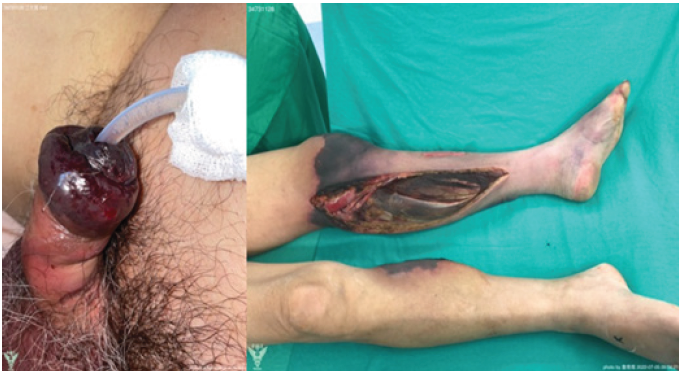Opinion 
 Creative Commons, CC-BY
Creative Commons, CC-BY
Life-long Learning of Medicine and Clinical Reasoning to Fight Covid-19: A Personal Experience
*Corresponding author: Yueh Ren Ho, Department of Biochemistry and Molecular Biology, College of Medicine, National Cheng Kung University, University Road No.1, East District 701, Tainan City, Taiwan (R.O.C) and School of Medicine, College of Medicine, National Cheng Kung University, University Road No.1, East District 701, Tainan City, Taiwan (R.O.C).
Received: January 25, 2023; Published: January 27, 2023
DOI: 10.34297/AJBSR.2023.17.002418
Abstract
Diagnosis is a dynamic process. Misdiagnosis is not uncommon, even advanced diagnostic tests are available; the outcome may be catastrophic like loss of a limb or life. COVID-19 attacks multiple organs, causing different symptoms presenting variable specialties. Continuous education had been cancelled during this pandemic. How can individual Drs effectively learn the knowledge to offer quality care is a big issue.
COVID-19
Coronavirus disease 2019 (COVID-19 or covid) is caused by severe acute respiratory syndrome coronavirus 2 (SARS-CoV-2) [1]. Most patients manifest mild severity including fever, coughs, and sore throat, while some covid patients may face respiratory failure or even death, depending on variants, age, vaccination status, and comorbidity. Covid can cause serious extra-pulmonary complications: thrombo-embolic syndrome like stroke, myocardial infarction, and embolism of lungs and limbs [2]. The risk of such catastrophe may last six months [3]..
Life-Long Learning
Life-long learning is not a slogan; Drs need to learn till the last day of practicing medicine [4], Covid is new for most of Drs; some take care of these patients, some do not. Now covid can confront Drs with common symptoms. Without a high index of suspicion, key information and test may be missed. Today the internet with database including Medline is another textbook for learning knowledge of covid.
Clinical Reasoning
Not all medical schools provide clinical reasoning in their formal curricula. It is a core skill to solve clinical problems [5]. Internists work like diagnosticians; they need such a mental tool to avoid misdiagnosis. Facing covid pandemic, clinical reasoning is more wanted to deal with uncertainty and ambiguity. With time constraint, Drs had better comply with the principle: if it looks like covid, it probably is covid, so treat it as covid. Still, Drs need clinical reasoning more than ever.
Case Presentation
A 68-year-old man, a healthy retiree, presented to an emergency department (ED) with chief complaint of sudden onset of painless, gross hematuria. After a Foley catheter was placed, he was discharged, with a urologist consultation at the outpatient clinic one week later. Because of scrotal ecchymosis and swelling, he returned to the ED. He was diagnosed with liver abscess based on a CT scan and referred to another hospital.
The patient had low-grade fever and diarrhea 3 days before hematuria occurred. He was 172cm high and weighed 70kg. On arrival his temperature was 37.6℃, pulse 102, respiration 17, and blood pressure 135/87. His white cell counts were 22,500/mm3, hemoglobin 8g/dL, platelets 87,000/mm3, international normalized ratio of PT 1.7 and D-dimer was not tested, neither ferritin; random glucose was 163mg/dL, creatinine 1.2mg/dL, ALT 100IU/L, and CRP 226mg/dL. Urinalysis showed that that urine looked cloudy and reddish, with protein 2+, RBCs>100/hpf, WBCs>19/hpf. Chest film and ECG were both normal. Abdominal CT showed a lobulated lesion.
He was treated with antibiotic piperacillin/tazobactam. Very few abscesses were drained from the liver lesion, with around 150mL of blood collected in the following week. During the period his left scrotum became swollen and hyperpigmented, then his both legs swelled and hurt (Figure 1). First surgery was fasciotomy for left epididyno-orchitis, then emergent thrombectomy of left femoral vein and popliteal vein, and fasciotomy of left thigh, leg, and foot, and then left orchiectomy, at last left above-knee amputation and laparascopic left lateral hepatectomy 2weeks after admission. The pathology report excluded abscess, malignancy, and Trousseau syndrome.
Further inquiry found he had taken three anti-covid jabs and recovered from a mild covid two months earlier.
Conclusion
Diagnosis is a dynamic and complex process. There are thousands of diseases and laboratory tests, but fewer symptoms. So, different diseases may present with identical symptoms. Misdiagnosis or delayed diagnosis is no exception in medicine, because a key finding, or piece of information goes unnoticed like this patient. Drs treated him as common hematuria at the first encounter. The anchorage error persisted after very few abscesses was unexpectedly drained from the liver abscess. Glans gangrene was interpreted as trauma of catheterization. Deep venous thrombosis was not linked to the possibility of covid. They prematurely jumped to the conclusion.
Life-long learning is not a slogan; it is a prerequisite for perfectionism and professionalism in clinical medicine, especially when facing new diseases.
Conflict of Interest
The authors declare no potential conflict of interest.
References
- Wang W, Xu Y, Gao R, Lu R, Han K, et al. (2020) Detection of SARS-CoV-2 in different types of clinical specimens. JAMA 12(323): 1843-1844.
- Nappi F, Nappi P, Gambardella I, Singh S S A (2022) Thromboembolic disease and cardiac thrombotic complication in COVID-19: A systematic review. Metabolites 12(10): 889.
- Ho F K, Pell J P (2022) Thromboembolism and bleeding after covid-19. BMJ 377: o817.
- Teunissen P W, Dornan T (2008) The Competent novice: lifelong learning at work. BMJ 336: 667-669.
- Yazdani S, Abardeh M H (2019) Five decades of research and theorization on clinical reasoning: a criti-cal review. Adv Med Edu Practice. 10: 703-716.




 We use cookies to ensure you get the best experience on our website.
We use cookies to ensure you get the best experience on our website.